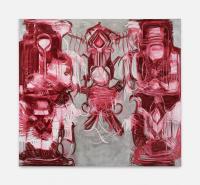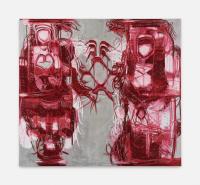Works


Installation Views
Press Release
In her exhibition ‘Nothing is Yours, Everything Is You‘, Melike Kara presents new paintings in a sitespecific installation made of photographs from her extensive personal archive, which gathers family pictures as well as other sources. It serves as an unofficial historical documentation of the Kurdish diaspora that has neither the means nor the resources to preserve its own history.
The bleachtreated and faded wallpaper based on archival images (vaster than sky, 2021) installed in the studio of Kölnischer Kunstverein captures rituals and traditions, memories and narratives passed down from generation to generation, resisting oblivion. This imagery is also found on cushion objects leaning against the wall and stacked on top of each other (Bridge ties and collective memories, both 2021), which traditionally invite people to social gatherings and ceremonies in teahouses and Alevi prayer houses. Generously occupying the exhibition spaces—in the lecture hall spread out on the floor as loose individual pages (to recall, 2021)the images merge and overlap, forming an individual as well as collective memory.
Whether in the form of a triptych in the outdoor area of the second floor or freestanding in the Riphahnsaal, Kara’s paintings are gesturalabstract compositions of hybrid forms and figures and draw on the formal language of Kurdish tribes’ textiles, including a transcultural carpetknotting technique. Kara interweaves the history of Western painting with influences from indigenous cultures, thus overriding the outdated strict categorization of art and craft.
The 3channel video installation calling together (2021) consists of intimate images and video recordings from the family environment and is set to folk music as well as poems written by the artist and read by her aunt in Kurdish. They are deliberately not translated here—an attempt to document a language that was banned in Turkey until 1991 and is also gradually being lost for this reason.

















